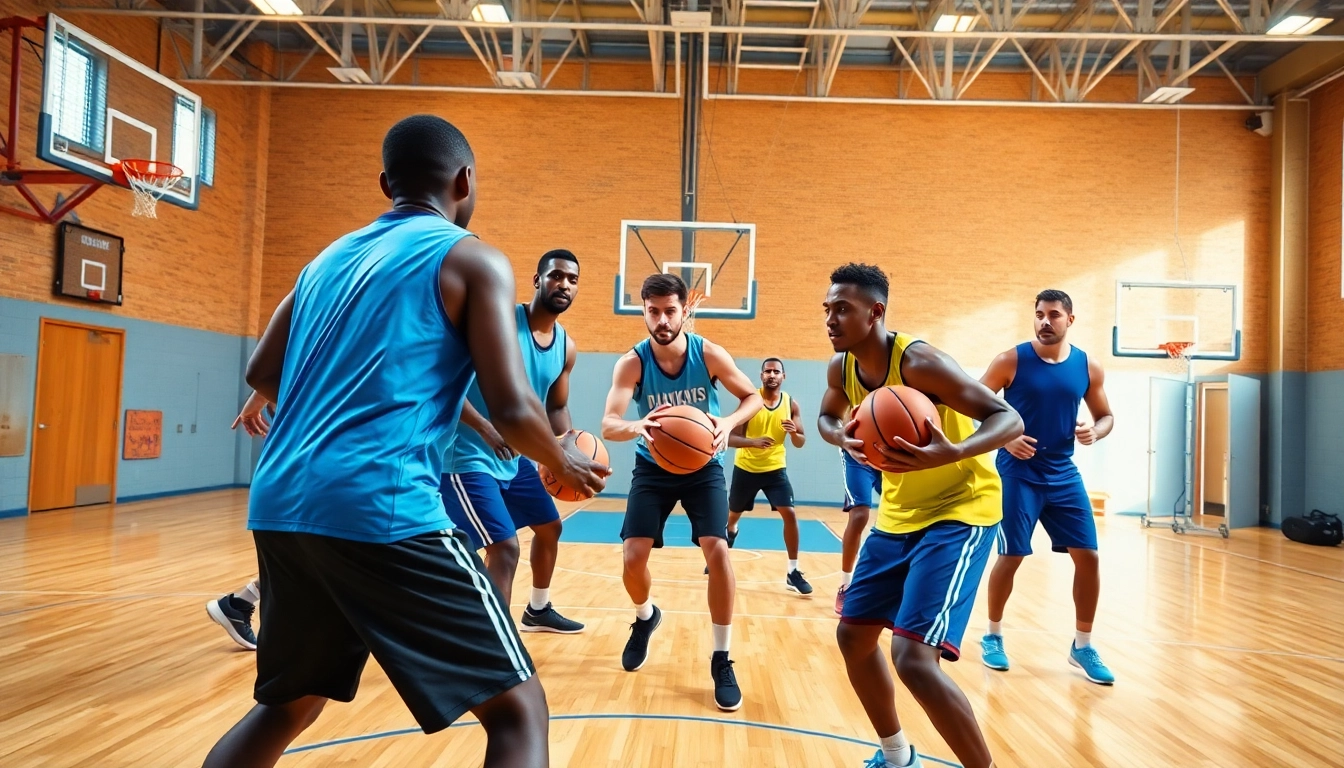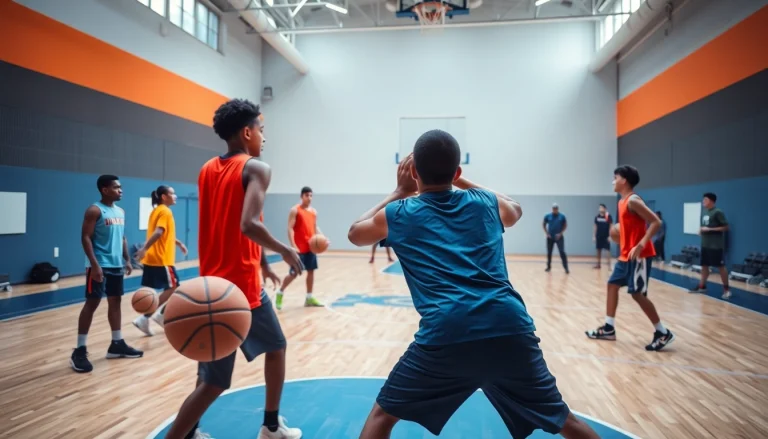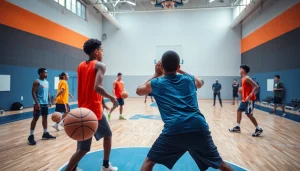Introduction to Basketball Training Programs
In the competitive world of basketball, the difference between a good player and a great player often comes down to rigorous training. For aspiring athletes, finding the best basketball training programs is essential to develop skills, build endurance, and foster a winning mindset. Coaches and training programs play a pivotal role in shaping a player’s journey, providing guidance, resources, and structure that can significantly enhance performance on the court.
Why Quality Training Matters
Quality basketball training is vital for several reasons. First and foremost, it helps players refine their technical skills, such as shooting, dribbling, and defense. Quality programs provide the foundational techniques that are critical for success in competitive situations. Additionally, proper training helps in the development of physical attributes such as speed, agility, and strength, which are essential for high-level play.
Moreover, engaging in structured training fosters a strong mental game, encouraging players to cultivate resilience, discipline, and strategic thinking. These soft skills are just as important as physical abilities in high-pressure situations, where mental composure can make all the difference. Investing time in quality training can transform players from novices into skilled competitors.
Types of Basketball Training Available
The landscape of basketball training is diverse, catering to different needs and skill levels. Here are some of the prevalent types:
- Individual Training: One-on-one sessions with a coach focused on personalized skill development.
- Group Training: Small group sessions that provide an interactive environment for practicing skills with peers.
- Team Training: Focused on building teamwork and strategic play, essential for organized competitions.
- Online Training Programs: A growing trend, offering flexibility to learn from anywhere with instructional videos and digital coaching.
- Camps and Clinics: Short-term training environments that often provide intensive skill building over a concentrated period.
Finding the Right Program for You
Choosing the right basketball training program is crucial for maximizing potential growth. Here are some steps to consider:
- Determine Your Goals: Are you looking to improve specific skills, gain competitive experience, or train for fitness? Identifying your goals is the first step.
- Research Programs: Look for programs that specialize in the areas you want to improve. Consider factors like location, reputation, and coaching style.
- Seek Recommendations: Talk to coaches, teammates, or friends who have experience with training programs.
- Trial Sessions: Take advantage of trial or introductory sessions to experience the program firsthand before committing.
- Evaluate Costs: Understand the financial commitment involved and balance it against the program’s potential benefits.
Essential Components of Effective Training
Skill Development Focus Areas
Effective basketball training focuses on several core skill development areas:
- Shooting: Mastery of shooting techniques is vital. This includes proper stance, mechanics, and shot selection.
- Ball Handling: Players must develop strong ball-handling skills to navigate defenses and maintain control under pressure.
- Defense: Understanding defensive principles, including positioning and anticipation, is crucial for effective play on both ends of the court.
- Passing: Developing good passing skills fosters teamwork and helps in executing plays efficiently.
Physical Conditioning and Endurance
Basketball is an incredibly demanding sport that requires exceptional physical conditioning. Training programs should incorporate:
- Strength Training: Building muscular strength through weight training. This is essential for enhancing performance and preventing injuries.
- Aerobic Conditioning: Improving cardiovascular fitness through running, cycling, or other aerobic exercises to sustain energy levels during games.
- Agility Training: Exercises focusing on agility, such as ladder drills, can improve footwork and lateral movement.
- Flexibility Training: Promoting mobility through stretching exercises to reduce injury risk and improve overall performance.
Mental Game: Building Confidence and Strategy
The mental game in basketball is equally as important as physical prowess. Players must cultivate mental resilience to handle the pressures of competition. Effective training programs often include:
- Visualization Techniques: Encouraging players to visualize successful plays and outcomes enhances performance through mental rehearsal.
- Mindfulness Exercises: Practices such as meditation or breathing techniques help athletes manage anxiety and maintain focus.
- Game Strategy: Understanding game tactics and situational play can significantly impact decision-making during matches.
Comparative Overview of Popular Basketball Training Programs
Local vs. Online Programs
In recent years, the availability of basketball training programs has expanded to include both local and online options. Local programs, such as those offered at community centers or specialized training facilities, provide hands-on coaching, personalized feedback, and valuable interactive experiences. However, online programs offer flexibility and accessibility, allowing players to train at their own pace and schedule. Popular platforms for online training include:
- Pure Sweat Basketball – A program that offers virtual training sessions, emphasizing skill development.
- Jordan Lawley’s Online Courses – Focused on ball-handling and basketball IQ, providing drills and techniques to enhance player development.
Price Range and Value Assessment
The price of basketball training programs can vary significantly. Individual coaching sessions may cost from $50 to over $150 per hour, while group sessions can be more cost-effective, averaging between $20 to $75 per person. Online programs typically present a flat fee structure, with costs ranging from free access with limited resources, up to a few hundred dollars for comprehensive, multi-month courses.
When evaluating the value of a program, consider the credentials of the coaching staff, the curriculum offered, and the potential for personal growth. Investing in reputable programs can yield sustained results, far outweighing the monetary costs involved.
Community Reviews and Testimonials
Before enrolling in any training program, it is crucial to consult community reviews and testimonials. This feedback can provide insights into the effectiveness of the coaching, program structure, and overall player satisfaction. Topics to inquire about include:
- The extent of skill improvement seen by participants.
- Coaches’ ability to engage and motivate players.
- The overall environment and culture of the program.
Check platforms like social media, forums, and local community boards to gather comprehensive insights.
Maximizing Your Training Experience
Setting Achievable Goals
Players should establish clear, achievable goals that align with their training objectives. Best practices for goal setting include:
- Specificity: Goals should be clear and defined, such as “improving free-throw percentage to 75% by the end of the season” rather than a vague “become a better shooter.”
- Measurable Outcomes: Set quantifiable criteria to monitor progress, making it easier to assess improvements.
- Realistic Timelines: Give yourself a feasible timeframe in which to achieve specific goals, allowing for adjustments if necessary.
Incorporating Feedback and Consistency
Feedback is a crucial component of effective training. Players should actively seek constructive criticism from coaches and peers to identify areas for improvement. To incorporate feedback effectively:
- Keep a journal to track feedback and personal reflections on training sessions.
- Set regular check-ins with coaches for one-on-one discussions about performance and progress.
- Stay consistent in practice; regularity in training sessions translates directly to improved skills.
Utilizing Additional Resources for Improvement
A successful basketball training program extends beyond the court. Players are encouraged to diversify their learning through:
- Video Analysis: Utilize video recordings of practice sessions or games to analyze performance and identify weaknesses.
- Books and Podcasts: Read materials or listen to content that covers basketball strategies, conditioning techniques, and mental toughness.
- Peer Collaboration: Create practice groups with teammates to share knowledge, drill together, and motivate each other.
Conclusion: Choosing the Best Basketball Training Program for Your Goals
Evaluating Your Progress and Making Adjustments
After enrolling in a training program, continuous evaluation is vital. Regularly assess progress against the goals established at the outset. Take note of improvements, setbacks, and adjustments needed to the training regimen. This analytical approach will allow you to continuously refine your training and ultimately enhance your performance.
The Importance of Continued Learning and Development
Basketball is an evolving sport; thus, continuous learning is essential. Players should remain open to new training techniques and methodologies. Engaging in refresher courses, attending clinics, or participating in workshops can perpetuate growth, ensuring skills remain sharp and relevant.
Encouragement for Aspiring Athletes
Lastly, players should maintain a positive mindset and remain committed to their training. Each setback presents an opportunity for learning, and dedication often leads to unexpected breakthroughs. With the right training program and a willingness to improve, aspiring athletes can achieve their basketball dreams, transforming potential into performance.








